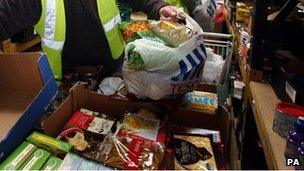Red Cross launches food aid campaign for Britain
- Published

The Red Cross said the initiative was a "toe in the water" for the organisation
The Red Cross is to start collecting food for families in the UK who are struggling to feed themselves.
The charity said the campaign was a first step in considering whether it should be doing more to tackle the current "food poverty challenge".
British Red Cross will send volunteers to supermarkets to ask shoppers to donate items to be given to food banks through the charity Fareshare.
It said there was strong evidence of families in need through food poverty.
Juliet Mountford, head of UK service development for the Red Cross, said: "For British Red Cross it's a toe in the water."
According to figures from the Trussell Trust food bank network, about 500,000 people in Britain needed support from food banks last year.
The Red Cross has asked its 30,000 volunteers in Britain to join Fareshare workers at up to 2,000 Tesco stores on the last weekend of November.
They will appeal to shoppers to donate tinned and packet foods, which will then be distributed to charities.
Financial crisis
Fareshare was set up as a project within homelessness charity Crisis in 1994 and has worked independently on tackling food poverty and food waste since 2004.
The Red Cross announced the initiative as it released a report on the humanitarian impact of Europe's financial crisis, which found a 75% increase in people relying on its food aid across the Continent over the last three years.
At least 43 million people across Europe are not getting enough to eat each day and 120 million are at risk of poverty, according to the report.
The Red Cross has provided food to refugees and to flooding victims in Cumbria in 2009, but it has not helped with nationwide food aid since World War II.
Oxfam's UK poverty director Chris Johnes told the Independent, external he was "genuinely shocked" that the Red Cross was getting involved in food collection.
He said: "They don't do things for reasons of grandstanding at all. The fact that they are doing this... is a very clear signal how serious things have become."
Food waste
A report last month found that large amounts of perfectly edible food go to waste because they are thrown away at the production stage or after purchase by consumers.
The study by the UK's global food security programme found that up to two fifths of a crop of fruit or vegetables can be discarded because it does not meet certain standards such as size or shape.
It also suggested that the average household throws away more than 5kg (11lb) of food a week, nearly two thirds of which is avoidable.
The waste costs £480 a year per household on average and £680 per family, according to the research.
Conservative minister Lord Freud provoked anger in July when he questioned whether there were "causal connections" between the rise of food banks and government austerity policies.
In September Education Secretary Michael Gove was accused of being "out of touch" when he appeared to suggest that families using food banks were responsible for their own predicament.
Labour said the Red Cross action was a wake-up call to the government over the cost of living crisis.
But a spokesman for the Department for Work and Pensions said it was supporting vulnerable groups through measures such as the winter fuel allowance and cold weather payments.
The spokesman said there was no "robust evidence" that welfare reforms were linked to the increased use of food banks.
- Published30 May 2013
- Published30 May 2013
- Published10 September 2013